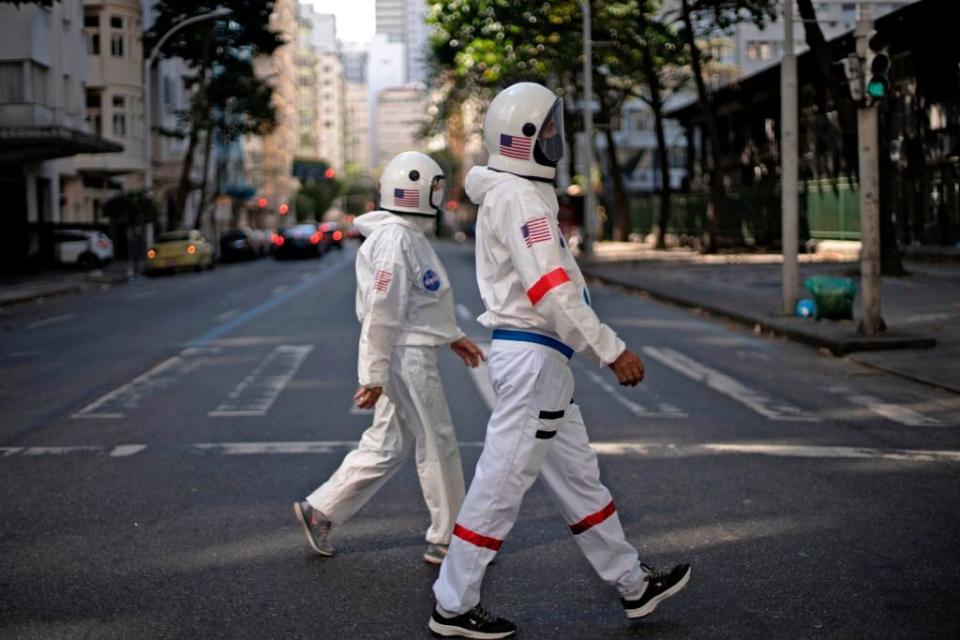Here in Rio, the lockdown-weary residents are desperate for normality

On Wednesday morning I cycled along Ipanema’s beachside promenade to meet my friends for coffee. The beach and its sidewalks were crammed with sunseekers – it was almost as busy as a bank holiday (feriado) weekend in pre-pandemic times.
I was joined by Andre, a Bolsonaro supporter, and Rodrigo, a diplomat, at my local haunt, Kraft Cafe. Is today is a public holiday, I asked. “No, people are just understandably tired of quarantine,” Rodrigo replied. “You can’t imagine living in a really small and crowded neighbourhood with barely any decent walkable streets. And most of these people are young; those not in the at-risk group just want to relax in the sunshine, as they always have”.
Despite Brazil’s ballooning cases (57,837 on Thursday), and its status as the second hardest hit country in the pandemic, concerns about Covid-19 amongst Rio’s residents are dwindling, with many believing that the city is fast approaching herd immunity.
“Official statistics show that, in Rio, the peak of the virus was back in May,” Andre told me. “My friends who work in the city’s hospitals tell me that the admission of new coronavirus patients is now very low”.
Even still, a federal government decision this week to partially reopen Brazil’s borders to visitors, ending a four-month travel ban in the hope of reviving an industry devastated by lockdown, has not been universally welcomed. “This is very rash,” Rodrigo said. “Just today, the country has registered our highest death toll ever: over 1,500.”

But Andre supports the move. “The spike in Brazil’s new coronavirus cases is centred in the country’s interior where the virus is spreading in small country towns without basic healthcare systems, but this is not the case in Rio,” he argued. “The focus here should be on saving the economy from the damaging effects of the pandemic.”
After coffee, I rushed back home for an online English lesson with my student Fabiana, who lives in Baixada Fluminense in the poorer North Zone of the city. She immediately raised her concerns about the alarming situation in her district. “Since the beginning of the quarantine people have not respected lockdown,” she said.
Fabiana holds President Jair Bolsonaro’s constant downplaying of the pandemic as the root cause of locals flouting anti-coronavirus rules. “Many people here believe Bolsonaro and think that the virus won’t affect them,” she added. “Also, poor families need to go out to work. Due to there being no inspection of overcrowded areas, my neighbours have been hosting social gatherings since the beginning of quarentine. They think that the global pandemic is being exaggerated by the media.”
In a city like Rio de Janeiro that lives for the outdoors, depriving local residents of their social lives has taken a toll on their mental wellbeing. Young people, in particular, are desperate to return to the streets.
Later, I met my friend Norton Frietzsche, a Destination Manager at GetYourGuide, for a drink at my favourite bar, Os Immortais in Copacabana. I was curious to know how he feels about the country reopening to foreign visitors.
“I don’t think this will have any practical effect on the tourism industry. With all the international negative media attention Brazil has been receiving on how poorly we’re been handling the pandemic, I don’t see how this measure could generate any inflow of international tourists in the coming weeks or months,” said Norton.
Romulo, the bar manager came over and poured us a complimentary glass of cachaca. With or without the influx of visitors, he told us, “the Carioca spirit, thirst for life and optimism will ensure that we will survive the rest of the year and we’ll welcome our friends from abroad back when they are confident to travel to Brazil again.” I took a sip, soaked up thre sunset, and found it hard to disagree.

 Yahoo News
Yahoo News 
